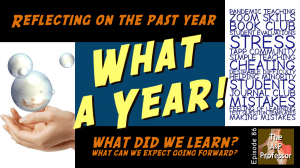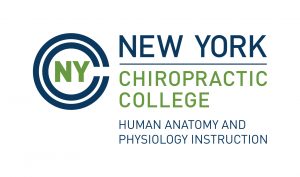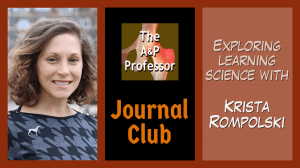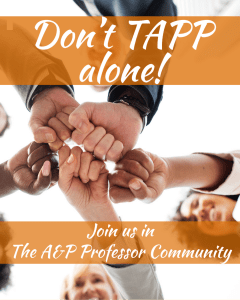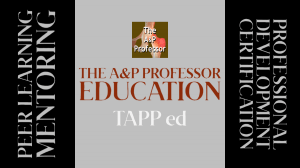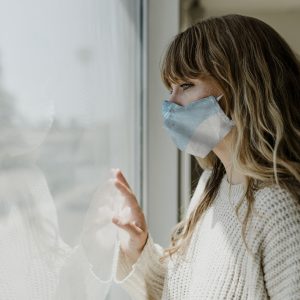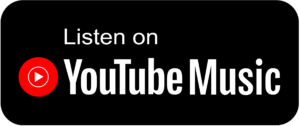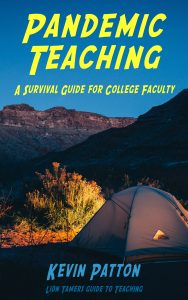What a Year! | Pandemic Teaching & More | A Reflection
TAPP Radio Episode 86
Episode
Episode | Quick Take
In his annual look back at this podcast, host Kevin Patton reviews what we learned this year in A&P teaching. Which was a lot! He also looks ahead to what to expect in teaching—and in the podcast—as we go forward.
- 00:00 | Introduction & Quotation
- 00:49 | Looking Back
- 10:15 | Those Darn Sponsor Messages
- 14:40 | There’s More!
- 22:49 | Psychic Predictions
- 38:30 | TAPP Community
- 47:02 | TAPP Education | TAPP-ed
- 51:34 | Our Complex Selves
- 55:35 | Staying Connected
Episode | Listen Now
Episode | Show Notes
Looking back we see with great clarity, and what once appeared as difficulties now reveal themselves as blessings. (Dan Millman)
Looking Back…
9.5 minutes
Kevin kicks off his annual debriefing of the last full year of this podcast, which started its fourth year on 15 January 2021. As usual, the podcast seems to have accomplished a lot more than he was thinking.
- Podcast Archive | 2020 (all the 2020 episode lined up on one page)
- Podcast List (sortable list of all episodes with topics listed)
- Pandemic Teaching (all the TAPP resources on pandemic teaching listed in one place)
Those Darn Sponsor Messages
4.5 minutes
Sponsor messages are a fair trade when somebody else pays for your podcast listening. And they give important reminders about programs and services available to you and your colleagues!
Sponsored by AAA
A searchable transcript for this episode, as well as the captioned audiogram of this episode, are sponsored by the American Association for Anatomy (AAA) at anatomy.org.
Don’t forget—HAPS members get a deep discount on AAA membership!
Sponsored by HAPS
The Human Anatomy & Physiology Society (HAPS) is a sponsor of this podcast. You can help appreciate their support by clicking the link below and checking out the many resources and benefits found there. Watch for virtual town hall meetings and upcoming regional meetings!
Sponsored by HAPI Online Graduate Program
The Master of Science in Human Anatomy & Physiology Instruction—the MS-HAPI—is a graduate program for A&P teachers, especially for those who already have a graduate/professional degree. A combination of science courses (enough to qualify you to teach at the college level) and courses in contemporary instructional practice, this program helps you be your best in both on-campus and remote teaching. Kevin Patton is a faculty member in this program. Check it out!
There’s more!
8 minutes
Some changes and additions over the last year…
- And listens are up 30% over last year!
- We moved away from Preview episodes, but till have occasional Word Dissections (22 in 2020) and recommendations from The A&P Professor Book Club (7 in 2020).
- Kevin’s new bestselling book based partly on podcast content: Pandemic Teaching: A Survival Guide for College Faculty. The free eBook was released in April and the paper back is due out any day. books2read.com/pandemicteaching
- Krista Rompolski created The A&P Professor Journal Club, which offered three special episodes this year.
- TAPP Journal Club (listing of all the Journal Club episodes)
Psychic Predictions
15.5 minutes
Kevin uses his psychic powers (meaning he uses his mind) to predict trends for the coming year and beyond.
- The current pandemic will extend through the next academic year and there may be more pandemics to come.
- Fauci says herd immunity possible by fall, ‘normality’ by end of 2021 (news from The Harvard Gazette) my-ap.us/3ceYHtY
- Avian Influenza Virus (H5N1): a Threat to Human Health (review article) my-ap.us/3pi0CBH
- 100 Years Since 1918: Are We Ready for the Next Pandemic? (interesting slide presentation published just prior to COVID-19 pandemic, links the 1918 pandemic to current needs for preparedness) my-ap.us/3a1NaeO
- 10 infectious diseases that could be the next pandemic (post from a vaccination alliance) my-ap.us/36fp27o
- Changes in staffing, working conditions, contract protections, tenure, etc.
- As the Pandemic Hits Campus Finances, Faculty Face Layoffs (article from The Scientist) my-ap.us/3cqmtDt
- Hit by Covid-19, Colleges Do the Unthinkable and Cut Tenure | Schools facing steep drops in revenue scale back the age-old role of faculty in governance (article from The Wall Street Journal) my-ap.us/2M3ZRO0
TAPP Community
8.5 minutes
This year, we took The A&P Professor experience to a new level by offering the new online private community away from distracting social media platforms, tangle email threads, and the roiling sea of available webinars. It’s still in its embryonic stage, but we wanted to get it out there during the pandemic when faculty need it the most.
- Discussions that matter. In our private space, we can have the vulnerability needed for authentic, deep discussions. Discussions not limited to a sentence or two at a time.
- No ads. No spam. No fake news. No thoughtless re-shares. Just plain old connection with others who do what you do!
- Privacy. The A&P Professor community has the connectivity of Facebook and Twitter, but the security of a private membership site. None of your information can be shared outside the community, so you can share what you like without it being re-shared to the world. Like your dean, for instance. In our community, you can share your frustrations freely. And find support.
- No algorithms. You get to choose what you want to see. You curate your own feed, selecting only those topics that interest you. Join subgroups that resonate with who you are—or who you want to be.
- Access to mentors and like-minded peers. Our community is made up of all kinds of people from all over the world, each with different perspectives and experiences of teaching A&P. Find members near you—or far away. Connect with members online at that moment.
- Courses, groups, and live events. As the community grows, we’ll add mini-courses and micro-courses—some with earned micro-credentials, live virtual office hours with me and other mentors or guests, private special-interest groups, and more.
- There is a very modest subscription fee to join our community.
- Deep anniversary discount on subscription to The A&P Professor community (good until end of February 2021) theAPprofessor.org/Insider21
TAPP Education | TAPP-ed
4.5 minutes
Now all the professional development—that continuing education—that you do when you listen to The A&P Professor podcast, read the books recommended in The A&P Professor Book Club, watch the online seminars at The A&P Professor website, any micro-courses or networking you do in The A&P Professor Community, can be documented with micro-credentials! It’s the new The A&P Professor Education or TAPP-ed initiative.
Click this link to claim your credential for listening to this episode: form.jotform.com/210247218258150
Our Complex Selves
4 minutes
As we muddle through pandemic teaching, we become more complex. As we cycle through optimism, pessimism, hope, anxiety, triumph, we are changed. Some changes are good; some are not. We’ll probably come out of this with some sort of pandemic-related PTSD—at least in terms of our teaching experience. Building resilience and hope are essential. A supportive professional community—and your favorite podcast—can help.
- The A&P Professor Community
- It’s hard to be optimistic after surviving trauma, but it’s not impossible. Here’s how to start. | We all say we want to move on after terrible periods in our lives, but it can be more difficult than it sounds. (self-help article) my-ap.us/2NCGlsz
Need help accessing resources locked behind a paywall?
Check out this advice from Episode 32 to get what you need!
Episode | Captioned Audiogram
Episode | Transcript
The A&P Professor podcast (TAPP radio) episodes are made for listening, not reading. This transcript is provided for your convenience, but hey, it’s just not possible to capture the emphasis and dramatic delivery of the audio version. Or the cool theme music. Or laughs and snorts. And because it’s generated by a combo of machine and human transcription, it may not be exactly right. So I strongly recommend listening by clicking the audio player provided.
 This searchable transcript is supported by the
This searchable transcript is supported by the
American Association for Anatomy.
I'm a member—maybe you should be one, too!
Introduction & Quotation
Kevin Patton:
The American author and college professor Dan Millman once said, looking back, we see with great clarity and what once appeared as difficulties now reveal themselves as blessings.
Aileen:
Welcome to The A&P Professor, a few minutes to focus on teaching human anatomy and physiology with a veteran educator and teaching mentor, your host, Kevin Patton.
Kevin Patton:
In this episode, I review what we learned last year and take a look ahead to next year.
Looking Back
Kevin Patton:
If you’ve been listening to this podcast for a while, you know that I’m a big fan of actively doing a debriefing at natural pause points. Whether it’s a course or a podcast, I like to intentionally look back and see what I, what we, did over the last year. Besides reflecting on that which is usually a positive feeling for me, because I can see that I accomplished a lot more than my day-to-day feeling of always being behind in my goals usually lets me feel, so I bask in that for a bit. And I also like to take some time to look forward to what the next year might bring. And as usual, we got a lot more accomplished over the last year, this podcast, than I was thinking. After all, didn’t it all seemed like just a mad rush from crisis to crisis once the pandemic hit? Like the whole world was just sliding backward rather than moving forward.
Kevin Patton:
So now that we’re at the beginning of our fourth year of The A&P Professor podcast, let’s start with what we managed to get done over the last year. Then in later segments, we’ll look ahead to what’s on the horizon for the coming year. The first episode of last podcast here, which started on January 15th, that’s our anniversary, January 15th, that was episode 63, which had a short preview episode released in mid February. The main topic was making mistakes, which turned out to be an unintended but useful preparation for the pandemic teaching that would fall on our heads about a month or so later. When we’d all been doing things way differently than before making all kinds of mistakes…
Kevin Patton:
In episode 63, I also talked about something else that was kind of ironic considering the disaster we were heading toward. I provided an update and the mechanism by which stress can cause the graying of air. And so I think we’ve seen some of that, I know I have. I was already starting witha lot of gray and yep, I got more. Oh boy, looking back, I think I might have psychic powers because the other main topic of that episode had to do with yes, you guessed it immunology. Specifically a newly discovered type of lymphocyte called the X lymphocyte. We choose a sort of cat dog of lymphocytes being kind of like a B lymphocyte and kind of like a T lymphocyte. Then I just now real psychic powers apparently shifted into high gear in a bonus episode, 63 that followed shortly thereafter in February of 2020.
Kevin Patton:
That one was called midwinter winterizing of our courses. And it focused on tips on how to prepare for the possibility that each winter we might get the flu or something and have to be absent for a week or two or more, and then every once in a while, a campus gets shut down for health reasons. And I explained the concept of social distancing and how my hometown of St. Louis, whether the 1918 influenza pandemic way better than other major American cities by implementing strict social distancing regulations. Not having any clue at that point, that we were about to step into such a huge once in a century pandemic. That was quickly followed by another bonus episode, which I called the bonus episode 64, because I had already produced a regular episode 64, but I postponed it because the pandemic really did start hitting campuses across the world.
Kevin Patton:
This bonus episode 64 gave 19 practical tips for quickly shifting from face-to-face teaching to remote instruction. And a lot of those are still good by the way, so if you want to go back and listen to that one, I recommend that. I called that episode a “musical” because it featured for the first time some original music for my friend and widely known A&P instructor, Greg Crowther. Greg’s music has appeared in several episodes since then too.Then we had that regular episode 64 that I had planned, which featured a chat with medical memory expert, Chase DiMarco. Who helped us understand how the technique called the memory palace can help our students remember a large number of concepts, such as muscles or bones very quickly and accurately.
Kevin Patton:
And that was followed by several episodes, focused on pandemic teaching. These included topics such as fumbling first tries or FFTs, Zoom skills, and Zoom fatigue, and Zoom bombing, and all kinds of Zoom stuff, free online labs, virtual conferences, forming personal connections, and being present in distance learning. How to manage teaching from home, including a faculty office in a box. Doing video walkthroughs of online platforms for students. Free offers from vendors, including ADInstruments, who sponsored a few episodes this year. Reviewing retrieval practice and how it can fit into pandemic teaching, what the pathology called pandemic heart is. The stress of teaching during a pandemic and value of community and coping with that stress and more, much more. But they’re all still there, and so why not go back and revisit them?
Kevin Patton:
We also talked about building resilience in us and in our students, about best practices and coming back to classroom teaching while using health protective gear, distancing, and other new procedures, and how an arm span or wingspan is how much better the measure of a health protecting distance than would be using two arm lengths, in a discussion that was part practical classroom management, and partly about basic concepts of anatomy. And there were some topics that are timeless, but also have particular applications to pandemic teaching such as cheating, including plagiarism and Rogeting and promoting academic integrity.
Kevin Patton:
We also had a syllabus special with a long list of tips for syllabuses and first day experiences and safety practices and use of personal pronouns and what to do with a syllabus if it’s too long. And we talked about some underappreciated and sometimes unknown features of digital textbooks, including ways that they can be used to communicate with students remotely. And we talked about the value of desirable difficulty in courses. There were a couple of episodes in which I shared my kind of goofy analogies for teaching metabolic pathways, including how I turn the story of the Krebs cycle-
Crowd:
[crosstalk] Oh no! NOT the Krebs cycle! Nooo.
Kevin Patton:
… into a kind of horror story. And I used the analogy of a water wheel in explaining the role of the electron transport system. And we recently had two episodes on student evaluation of teaching or SETs, why they’re problematic and what we can do to help manage or mitigate those problems. And we had some updates in sensory biology, a newly discovered naturally occurring, four stranded form of DNA that yes it’s found in human cells, and the newly discovered tubarial salivary glands in our throat. And well, a whole lot more. I’ll be walking us through a bit more of that, including some really exciting new things that we did this year after this next segment.
Those Darn Sponsor Messages
Kevin Patton:
Yeah, I know, it’s kind of annoying sometimes to have those little sponsor messages stuck in between the other segments, just like when I listen to public radio, right? But not nearly as bad as commercial radio, so there’s that. In public radio and in this podcast, those sponsor messages help you, and I understand how all that other content gets you. It’s the sponsors who sponsor that content. For example, it’s the master of science in human anatomy and physiology instruction, the HAPI degree that pays for free distribution of this podcast, including the free TAPP app available in your device’s app store. It’s only right that I mentioned them in every podcast, and it’s only right that you hear who’s paying for your experience. And maybe it’s not too much to ask that you go to nycc.edu/hapi, that’s H-A-P-I and check out this program, because you just never know when someone is going to ask you for advice on getting some solid training in teaching A&P. Or when you have the urge to give some unasked for advice in that direction.
Kevin Patton:
Another example is the marketing support for this podcast, that’s provided by HAPS, the Human Anatomy and Physiology Society. Their marketing have been what led you here in the first place. And you wouldn’t want to deny that opportunity to other A&P faculty, would you? And besides, as with our other sponsors, I really believe in HAPS and have no apologies about getting both members and non-members to go visit HAPS at theAPprofessor.org/haps that’s H-A-P-S to see what’s happening, because there’s always a lot happening, that’s going to help me and you be better and be more connected and be more supported.
Kevin Patton:
Last in this list of sponsors, but the first to actually sponsor this podcast is the American Association for Anatomy or AAA. They cover the cost of the searchable transcript and the captions for the video audiogram that’s available for each episode. Besides helping us walk the walk of universal design and accessibility, a searchable transcript helps you well search for terms or topics from the entire library of episodes. It’s almost impossible to find which episode covered a particular topic you want to revisit if everything’s in audio only, right? And if you visit the American Association for Anatomy at anatomy.org, you’ll find out that they really do back up their promise to serve those of us who teach anatomy and physiology.
Kevin Patton:
And that brings us to an important point about our sponsors and their sponsor messages. Besides acknowledging sponsor support of this podcast, they also give me an opportunity to teach you about or remind you about the many things that make our sponsors useful to you and I, as an A&P instructor. I’ve been involved with all three major sponsors for a long, long time. And I mean it, when I say, I believe in them. And you know what? They believe in me and they believe in you too. I mean that. Next time you interact with any of these three sponsors, and I hope you do that soon, please do all of us a favor by mentioning to them that you appreciate their support of this podcast.
There’s More!
Kevin Patton:
Remember I said in an earlier segment that there’s more we accomplished over the last year than I’ve already mentioned, well, now’s the time to look at that. Looking in some stats first, there’s been a 30% increase in total episode listens over the last year. So, wow, thank you so much for listening. We had 28 episodes all together last year, including bonus episodes and preview episodes. Early in the year, I stopped doing preview episodes. They were kind of confusing and they didn’t fit with my plan to go into a twice a month schedule. The word, dissection feature of the previews still shows up occasionally in regular episodes as does The A&P Professor Book Club.
Kevin Patton:
This year, we had 22 word dissections here and there where we practice what we all do in our teaching and take apart words and translate their parts to deepen our understanding. Sometimes they’re old and familiar terms, and sometimes they’re terms new to us, or maybe so fresh, and that they’re new to everyone. They included discussions of these 22 terms, imposter syndrome, norepinephrine, noradrenaline, adrenergic, melanin, eumelanin, pheomelanin, HLA, mnemonic, mnemonist, loci and locus, COVID-19, virus, coronavirus, SARS-CoV-2, pandemic, epidemic, stress cardiomyopathy, Takotsubo cardiomyopathy, apical ballooning syndrome, cardioid, and acronym.
Kevin Patton:
And The A&P Professor Book Club recommendations this year included these seven books. First one is Gulp: Adventures on the Alimentary Canal by Mary Roach. The next one is Read This Before Medical School: How to Study Smarter and Live Better While Excelling in Class and on your USMLE or COMLEX Board Exams, and that was written by Chase DiMarco. Our third one was Presentation Zen: Simple Ideas on Presentation Design and Delivery by Garr Reynolds. The fourth one was Mindset: The New Psychology of Success by Carol S. Dweck. The Concise Book of Muscles by Chris Jarmey, Digital Minimalism by Cal Newport, and lastly Bones inside and out by Roy meals, with whom we chatted in episode 82. Don’t forget if you send in a recommendation for the book club, you get an Amazon gift certificate as a thank you gift. Preferably it’ll be an audio recommendation that I can use directly in the podcast, but should in any case include a couple or so paragraphs about why you are recommending the book for A&P faculty.
Kevin Patton:
Speaking of books, I also released a book myself called Pandemic Teaching: A Survival Guide for College Faculty, and it was based partly on some of the content of this podcast. It’s available free as an ebook, and it will be released to any day now in a paperback edition. To find this book, just go to Books2Read that’s books, the number two, read.com/pandemicteaching. That actually hit Amazon’s best seller list in its category last spring, believe it or not. So it’s been helping a lot of people. And would you do me a favor and share that link with your teaching colleagues across your campus? Maybe even your teaching center? Once again, it’s books2read.com/pandemicteaching. Another really big thing I did in the podcast is really a really big thing that my friend Krista Rompolski did, she created a special kind of episode called The A&P Professor Journal Club.
Kevin Patton:
It’s an occasional thing where she brings a journal article that she’s found that speaks powerfully to what we do as A&P instructors. Then we discuss it and how it can help us all be better at teaching A&P and how our students can be more successful. In this first year of The A&P Professor Journal Club, we had three of those special episodes. In episode 69, Krista brought a journal article that discussed how learning is affected by delivery style. That is how is learning impacted by face-to-face learning versus videos delivered online. And this research suggested that it was the level of engagement, not the delivery style that affects learning. In episode 71, Krista brought us an article that demonstrated that minority achievement gaps in STEM courses can be mitigated by the mindset of the faculty.
Kevin Patton:
That is minority students do as well in our courses as any other student if we have a growth mindset that views all students as potentially successful, rather than if we had a fixed mindset that view some students as unlikely to succeed. A very timely topic as we educators grapple with our past failures in dealing with issues of diversity, equity and inclusion. In episode 83, Krista shared some research showing that students feel like they learn more in a passive learning environment compared to an active learning environment, but measures of learning actually show the opposite. That is students tend to learn better through active learning. The researchers also showed that revealing this discovery to students at the beginning of a course can go a long way in helping students feel they’re learning more accurately.
Kevin Patton:
We also had a special episode in which an author of a journal article came on the podcast to discuss his recent research in A&P teaching. It was our music master Greg Crowther, who shared with us his technique called TQT, which stands for test question template. In a nutshell, it’s a way to get students to develop critical thinking skills as they devise potential higher order test questions. It’s really quite extraordinary, and I’m recommending you listen or re-listen to episode 70 to more fully understand how this strategy works. Oh wow, I’m glad I did this debriefing. I did get a lot done this year. It didn’t feel like it, but I guess I did. And both you and I learned a lot from all of this year, didn’t we? Well, hold on because now it’s time to look forward to what’s in store for this coming year.
Psychic Predictions
Kevin Patton:
In this episode, I’ve already given a rundown of what’s happened in this podcast over the last year, which in some ways has reflected a bit of what’s happening in A&P teaching in general. Now I want to share some thoughts about what might be happening going forward. Okay. These are not really psychic predictions, these are patterns that I see happening, and suppositions or what ifs based on those patterns. You’re probably seeing most or all of these patterns too, and maybe you’ve have made some of the same predictions. And some of these things I’m going to list are things I actually have in my notebook as plans, so clearly nothing psychic about that, except wait, psychic doesn’t always mean paranormal predictions of the future, the word literally means related to the mind. And so using my mind to see patterns and suspicions that certain generalities may play out really is a psychic phenomenon, right? So, yeah. Okay. I’m going to own this. These are psychic predictions for the coming year and beyond.
Kevin Patton:
First off, I think this pandemic is going to continue through the next academic year. I think a lot of experts are saying that, so that’s not me. I’m just repeating what I’m hearing from people I trust. And there might be another pandemic that overlaps that or follows up on that. For example, avian influenza virus, the H5N1 virus that might cause a pandemic that’s on the horizon and could be anything else too, even Ebola or something like that. And maybe there’ll be a new virus or some other kind of pathogen pop up along the way, one never knows. So we’re not going to be doing any post pandemic teaching this coming year I think. We’re still going to be doing pandemic teaching. But what we will be doing will be the foundation of post pandemic teaching, which I think will include these things. I think that going forward, even after the pandemic and in-between future pandemics, we’re going to see more use of video techniques in teaching. We’re going to see more audio. We’re going to even see more podcasts. Podcasts themselves are really growing tremendously and have continued that growth through this pandemic. I mean, exponential growth. It’s the next big, hot thing.
Kevin Patton:
More and more I’m seeing that instructors are making podcasts for their students. Sometimes for A&P students in general, but very often specific to their course. And podcasting is a really great tool and technologically very easy tool to get right in the ears of your students and really make the kinds of connections, and have that engagement, which research shows is really important for student learning. Much more than techniques it’s the engagement we have learned that counts. I think there’s going to be a lot more online testing in the post pandemic era, and there’s going to be more frequent formative testing, where we do lots of quizzes or online tests and so on that are going to really get the students doing that retrieval practice that they need to get everything into their long-term memory. And just a little reminder, there are a lot of us who think of retrieval practice and improvement of memory skills as being all about just that lower order thinking of memorizing facts, but retrieval practice also includes retrieving how to solve problems or how to go about solving problems.
Kevin Patton:
And so retrieval practice can up … and even the retrieval practice that we’re doing in formative online tests and quizzes that can include both the lower order level of learning, which is the necessary foundation in A&P, as well as those high order skills, which allow students to apply all of those facts that they’ve learned and put into their long-term memory. I think we’re also going to see in post pandemic teaching less use of proctoring strategies of online tests. Partly because we’re going to see the value of these formative tests, but partly because we’re going to see that a lot of that proctoring does more harm than good, and I think we might also, I’m hoping that we’re going to find better ways to really not have to proctor, not really rely on that for our student integrity so much. Really emphasize and build up the integrity part in the student rather than the strategies that sort of catch them in the act of not showing integrity that proctoring does.
Kevin Patton:
I also think that in the post pandemic era, we’re going to make more use of evidence-based teaching. I think that this is going to help us break out of our shells. And that’s a difficult thing for me to do, and I know it’s a difficult thing for some of you to do because I’ve had conversations with you about this, and that is, we get these mindsets where we’re kind of stuck in a way. Well, that’s the way I learned it, or that’s the way it’s always been done or that’s the way everybody in my department does, and there’s a lot of peer pressure that I do it this way, and I think that some of those barriers are going to break down and we’re going to see more and more changes to the way we teach based on what the evidence is telling us works best.
Kevin Patton:
And I think we’re going to see much more availability of products available to us, both at a cost and open resource products that are going to serve remote teaching. Because a lot of those things that serve remote teaching can also serve face-to-face teaching. And I think we’re going to see more incorporation of those things that we learned how to do and do well during the pandemic era, and we’re going to bring those over with us into the post pandemic era. Now over the next year and beyond, I think that faculty will generally feel more confident in their ability to pivot. Because once you go through something like pandemic teaching I think we’re going to have this attitude of, wow, I can do anything, I can handle anything. If I handled that, if I lived through that barely but lived through it, I think I can switch gears at a moment’s notice, been there, done that.
Kevin Patton:
I think that teachers are going to be much more confident in their technology skills. I think even though we’ve been using a lot of educational technology for a very long time in higher education, there’s still this broad feeling of lack of confidence in it. And I don’t mean lack of confidence in the technology itself, I think lack of self confidence in our ability to use it. Pretty frequently, I’m an early adopter of instructional technology, or at least in that first or second wave of users, and I consider myself somewhat technologically competent, able to learn new technological strategies, but even so I don’t feel as confident as I’d like to feel about that sort of thing. Like, oh yeah, I never heard of that before, but it sounds cool, I think I’ll try it.
Kevin Patton:
And of course there’s even more people out there that are like, “Oh my gosh, I could never do that. That sounds like technology to me.” And I think that we probably do more of this in science than in perhaps some other disciplines, but even so there are many of us who lack that self-confidence and I see that really increasing in the post pandemic era. because we were forced in during the pandemic. Right? And I think that faculty in general are going to feel more confident in their ability to truly connect with students in online and remote courses. I think that’s one of the big hesitancies that teachers that have never done distance education have, in dipping their toe into the water of distance education.
Kevin Patton:
And that is how can I stay connected with my students? I love those connections with my students. And I’m saying that both rhetorically and, that’s what I believe. I love connections with students. That’s why I’ve stayed in teaching so long. That’s why I love teaching so much, is those connections with students. And I had that attitude, like how can you possibly replicate that in a distance course? Well, you can’t replicate the exact same thing, but you can replicate other kinds of connections. There are other ways to make connections. And I think that a lot of us in this pandemic aren’t there yet, we’re just now getting there, but I think by time we’re done with the next academic year, I think that quite a few of us are going to start to really love distance education.
Kevin Patton:
I mean, it’s apples and oranges in many ways, and even though I’ve been doing distance education for quite a while, and I haven’t done face-to-face teaching, I mean, except for a little bursts here and there, I haven’t been doing it for a number of years and I really missed it at first, and then I missed it less. And you know what? Years later, I still miss it, but not so much. And I really look forward to my distance classes. I love my distance classes, I love the engagement I have with my students in distinct classes, and maybe as you’re already finding, I find that some of my connections with my distance students are much deeper and have a much higher quality than they ever were, at least generally speaking in my face-to-face classes.
Kevin Patton:
So I think more faculty are going to see that, and they’re going to have more confidence in just the idea of distance education going forward. And I’m going to circle back to that in a little later. I also think that A&P teachers are generally going to be more nimble and more resilient and less likely to suffer when a sudden shift occurs. Not just a sudden shift from face-to-face to remote teaching, but any kind of a shift that we’re going to be faced with. Because we will have had the experience, and we would have learned with the coping skills, at least some of the coping skills that we need when there’s a sudden shift. So yeah, more nimble. Now, it’s not going to be like magic, we’re not going to end up being super resilient, we’re going to end up being better than we were. And some of us maybe much better than before, but still not probably super resilient. That’s a goal, right? We should have that goal, but I don’t know if many of us are actually going to get there, but we’re going to be kind of super resilient I think.
Kevin Patton:
I think there’s also going to be a dark side too. I think we’ll all experience a kind of post-traumatic stress disorder related to pandemic teaching. I think it might already be starting in a lot of us. And I think it’s not going to just disappear someday, a few years down the road after the pandemic is over. I think we’re going to have to live with it for the rest of our lives and manage it for the rest of our lives, but I’m optimistic that there will be support for each other and from our schools and from our communities to help us manage the PTSD and live with it. We got to have hope, right? We’re going to see a rapid rise in recognizing the legitimacy of online education. I told Jessica, I’m going to circle back to that. We’re going to see more people recognizing that online education is a legitimate form of education, and that is a big hurdle to have overcome.
Kevin Patton:
And non coincidentally, I think there’s going to be a rapid rise in institutions, expanding their offerings of online courses, online programs and online degrees. Now, there’s already been a rise before the pandemic teaching started, but I think it’s received a kick in the butt, and it’ll be accelerating even faster than it was before the pandemic. I think, or maybe I should say, I hope with some amount of doubt, but a hopeful kind of doubt that higher education institutions will go forward with a regular and ongoing practice of strategic planning for what if scenarios such as pandemics, so that when they have to pivot again in the near future, and I think there’s no doubt they will have to pivot again, they’ll be better prepared to do that.
Kevin Patton:
I also think that we’re going to see a lot more of the kind of shifts of staffing that have already begun. We’re going to see colleges and universities shift even more to reliance on part-time teachers for example. I think some of us will experience reductions or loss of teaching jobs. I hope that doesn’t happen. And A&P and other disciplines related to training healthcare providers maybe, I hope maybe somewhat protected compared to our colleagues in other disciplines, but I think we’re going to see some kind of shifting. And somewhat related to that, I think we’re going to see colleges and universities taking some unfair advantage of our current crisis mode to change policies and contractual obligations regarding working conditions and job protections. Something I for one will be vigilant about and will push back against. I hope you all will join me in that.
Kevin Patton:
So, yeah, even though I’m sometimes an optimist, perhaps often an optimist, I’m also sometimes a pessimist and that’s not a bad thing. Sometimes being a pessimist helps us be prepared for and recognize dangers. Dangers that we need to prepare for in order to survive in a way that can also sustain our optimism.
TAPP Community
Kevin Patton:
Okay. Let’s turn to a more positive look forward, specifically what the future may hold for the world of The A&P Professor. Let’s start off with one of the big events of this past year, which was taking The A&P Professor experience to the next level as a diverse community of faculty sharing our struggles and triumphs as we continue to develop ourselves as effective educators in anatomy and physiology. Yep, I’m talking about The A&P Professor community. It’s that safe space for connecting with others who do what you do, to share ideas, insights, practical tips, and to compare notes in an online community away from distracting social media platforms, tangled email threads, and webinars.
Kevin Patton:
It’s a great place to connect with me and other experienced mentors to help others struggling with things that you’ve mastered and solidify your network of experts for the next time you need help with something and you might need some help pretty quick. There’s no ads, no spam, no fake news, no thoughtless re-shares, just plain old connection with others. Others who do what you do. The A&P Professor community has the connectivity of Facebook and Twitter, but the security of a private membership site. None of your information can be shared outside the community, so you can share what you like without being it re-shared to the world. Like your DM, for example. In our community, you can share your frustrations freely and find support, and there’s no algorithms. You get to choose what you want to see. You curate your own feed selecting only those topics, that interest you. You can join subgroups that resonate with you with who you are or who you want to be. And as the community grows, we’re going to be adding min-courses and micro-courses, some with earned micro-credentials, which is something I’ll expand on in a few minutes.
Kevin Patton:
Something we’ve already added this year is a weekly TAPP Session. Remember TAPP, T-A-P-P is the acronym for The A&P Professor. And every Tuesday afternoon, we have sort of a virtual happy hour to just check in with each other for a few minutes. This might be especially important these days when it’s hard to do this life with our colleagues. And what a great way to stay connected to other A&P teachers from near and far? As we strive to cope with pandemic teaching. We need these person to person safe spaces, where we can connect with and lean on each other. I’m hoping to add additional live sessions where we can chat with experts and mentors with the knowledge and insights that can help us keep on keeping on. Now, there is a very modest subscription fee to join our community. Because you might already enjoy the benefits of The A&P Professor website, blog and podcast without a fee, you probably wonder why a subscription to this community? Why does it cost money?
Kevin Patton:
Well, there are two main reasons. The first reason is I’m simply asking you to pay your fair share. The infrastructure time and effort for those free resources I just mentioned are paid for partly from sponsorships, but mostly out of my personal teaching and writing income. And well, I kind of reached my limit there. And reason two is that it’s worth it. It’s an investment in your career, in the success of your students and in your personal satisfaction as an A&P educator. Before I tell you the subscription cost, think about this, how much would you expect to pay for just one session with a consultant, or pay for the tuition for one credit at your institution, or the cost of one decent anatomy or physiology reference book, or the amount you spend in one month of internet service? What’s your copay for one visit to a therapist? Any of those could cost 35 or 50 or a hundred, or probably even several hundred dollars. Besides those two reasons for having a subscription fee, when all members pay a fee, you know that you’ll see only those were willing to invest in themselves in the community.
Kevin Patton:
None of the casual drop-in trolls, bullies, bots, promoters, or know-it-alls, that we see elsewhere. We have guidelines and those who can’t follow them will be counseled and perhaps removed. Way back in episode 77 I mentioned that before I set up The A&P Professor community, I took a course in how to do this. And in this course, and in some consulting I got from other knowledgeable sources, it was clear that $25 a month is a typical minimum monthly fee for the type of community that I’m imagining, not the average, the minimum. And I decided that to start off with, I could probably do just half that, or at least I’ll try about half that. So I settled on 1299 a month with an annual option of 12,999, which works out to be just under $11 a month or about 36 cents a day. And remember, it’s something you can and likely will use every day.
Kevin Patton:
But to celebrate finishing another year of this podcast, I’m offering a special insider’s rate of just 499 a month, or 4999, if you’re paying annually, which works out to about $4 and 17 cents a month. That’s almost 70% off the regular subscription fee, which in turn is about half of its estimated minimum value. Now, to claim the insider’s plan, just go to theAPprofessor.org/insider21 before the end of February. And remember February is shorter this year than last year, so maybe you just better do it right now. Once you claim this discount, that’s the price you pay going forward. There’s a 14 day free trial before you have to pay anything. But once you pay that discounted price is locked in as long as you’re a member of the community.
Kevin Patton:
Yeah, there are student and retiree membership plans too. And if you’re in financial distress, you can ask about our scholarships, which by the way, may involve washing a few dishes. Just contact me directly to find out about these options. And don’t forget to ask your tax advisor about possibly deducting your subscription as a business related expense. Hey, you might even have a budget in your academic department for subscriptions, and they could pay for it. Keep in mind that we’re still just starting. One might say we’re still in the embryonic stage. So it’s up to you and the other community members to participate and build the community the way we all want it, and decide together what courses and events and resources we want or need. Remember together we’re better. Paraphrasing author Simon Sineck here, the opportunity is not to discover the perfect community for ourselves, the opportunity is to build the perfect community for each other. Once again, for that limited offer of a reduced subscription rate, just go to theAPprofessor.org/insider 21.
TAPP Education | TAPP-ed
Kevin Patton:
As I was reminding you that we started The A&P Professor community this year, I also mentioned that something to look forward to as we move forward is the availability of min-courses and micro-courses that will earn you some micro-credentials. So now’s the time to talk about some things that I’ve already started, but I haven’t told you about yet, at least not on the podcast. Something else new in the neighborhood. It’s called TAPP education or TAPP-ed for short. TAPP-ed is the professional development focus of The A&P Professor. One big feature of TAPP-ed is providing micro credentials that document your learning experiences. Among the many types of learning experiences at The A&P Professor, our podcast episodes, online seminars, those mini-courses and workshops available in The A&P Professor community, professional networking activities in The A&P Professor community, and last but not least any readings you do from The A&P Professor Book Club.
Kevin Patton:
Now digital micro-credentials are portable documents that affirm and certify your participation in specific learning activities and or the mastery of specific learning objectives. They’re an emerging phenomenon in business and in education that allows individuals to demonstrate competence in a more granular level than traditional transcripts and degrees. They also document all those little skills and added knowledge that we pick up here and there as we participate in both formal and self-directed professional development. So you have something that you can show on LinkedIn, in your CV, in your promotion packet, and in your faculty evaluation. You can even use these credentials to fulfill professional development requirements in some situations. Micro-credentials usually take the form of digital badges or certificates. The micro-credentials issued by TAPP-ed are a combined format, that is badges or certificates, your choice, you get them both. And it’s powered by Badgr a major player in the micro-credentialing ecosystem. Just go to theAPprofessor.org/education to find out more about how to earn these credentials.
Kevin Patton:
But in a nutshell, on every episode page and every book club entry and every seminar page at theAPprofessor.org, you’ll see a link to apply for credit for listening to that episode or reading that book or participating in that seminar. Then it’s simply a matter of filling out a brief form to verify your work and voila you’ve earned your credential. Later this year, I’m going to have an episode on micro-credentials, not just how they work in The A&P Professor arena, but also how they can be used by any of us to demonstrate our continued professional development. And also how we can offer micro-credentials within our own A&P courses to both motivate students and give them something more specific than a single course grade to demonstrate mastery of specific concepts within our course. I’ve been doing that for years, and I think it works really well.
Kevin Patton:
If you have questions that you want to ask about micro-credentials or experiences with micro-credentials that you want to share on this podcast, now’s a great time to send those to me, preferably in the form of a brief audio file. Remember the link is theAPprofessor.org/education to find out more about earning micro-credentials here.
Our Complex Selves
Kevin Patton:
When all is said and sudden done, as we begin a new year, we’re still experiencing stress. We have good days, sure, but also bad days. And sometimes very bad days. Well, of course our society is in crisis at multiple levels. Our courses, our campuses, our academic lives have been turned upside down and inside out. Our personal lives may be in various states of chaos or confusion or simple isolation.
Kevin Patton:
Professionals who help people deal with such trauma tells us that we all experience it differently. So if I’m doing sort of, okay, I can’t expect others to have the same reactions as I do. Based on our biological makeup and personal experiences we’re just all kind of unique in that regard. Knowing that helps me deal with my colleagues and my students, and it helps me understand my own reactions better. But all of us have had some successes, some blessings, and professionals tell us that if we can use those as touchstones in our memory to recall during times that are especially tough, it may help us through. One strategy that may help us is to move away from a single self image and recognize that we’re building a complex new self, as we go through these overlapping crises.
Kevin Patton:
That pessimism is part of that complex self, and it serves the important function of helping us recognize and prepare for potential dangers. But we can also build or reinforce that optimistic part of our complex selves to help us eventually get to moments of hope even on bad days or maybe the day after our bad day. I’m old enough and unlucky enough to have weathered a few really bad storms, both literal and figurative dens of lions. And looking back, I find that maybe I’m luckier than I think. I’ve become a more complex, more resilient and better self, even a more hopeful self when I’ve gotten help, leaned on friends, family, colleagues, and even healthcare professionals. And when I persisted in that internal work of dealing with traumatic experiences, it’s hard work, and sometimes I just don’t want to do it.
Kevin Patton:
Sometimes I’ve felt like I simply can’t do it, but I know that if I don’t do it, even if it’s just a tiny little bit of work every once in a while, on days when I am able to do it, if I don’t do that, it’ll be very difficult to make it through the whole experience. I’m hoping that the work we’re doing in this podcast and in The A&P Professor community in concert with the work that we’re doing and AAA, HAPS and the HAPI program is helpful in supporting your internal work on your complex, pessimistic, optimistic, happy, angry, fearful, hopeful self. And if I can help you in a different way, well, you know how to reach me.
Staying Connected
Kevin Patton:
Wow. We all learned a lot this year in this podcast, especially me. And we’ve clearly got a lot of new adventures ahead of us. Hey, let’s get more folks to join us on this journey. There’s an easy way to share this podcast with a peer and also earn yourself a bit of cash. Simply go to theAPprofessor.org/refer to get a personalized share link that will not only get your friend all set up in a podcast player of their choice. It’ll also get you on your way to earning a cash reward, refer two friends, and you get $5 refer 10 friends, and you get $25. Really. If you don’t see links in your podcast player, go to the show notes at the episode page at theAPprofessor.org/86, where you can explore any ideas mentioned in this podcast, and you’re always encouraged to call in with your questions, comments, book club recommendations, and other ideas at the podcast hotline. That’s 1-833-LION-DEN or 1-833-546-6336, or send a recording or a written message to podcast at theAPprofessor.org. And you’re invited to join my private A&P teaching community way off the social platforms at theAPprofessor.org/community. I’ll see you down the road.
Aileen:
The A&P Professor is hosted by Dr. Kevin Patton, an award-winning professor and textbook author in human anatomy and physiology.
Kevin Patton:
Please refill the contents of this episode when empty.
This podcast is sponsored by the
Human Anatomy & Physiology Society 
This podcast is sponsored by the
Master of Science in
Human Anatomy & Physiology Instruction 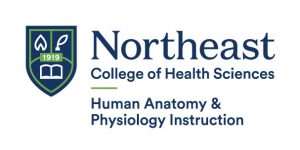
Transcripts & captions supported by
The American Association for Anatomy. 
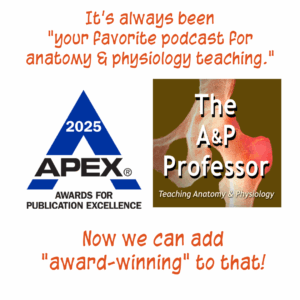
Stay Connected
The easiest way to keep up with new episodes is, um, wherever you already listen to audio!
Click here to be notified by email when new episodes become available (make sure The A&P Professor option is checked).
Call in
Record your question or share an idea and I may use it in a future podcast!
Toll-free: 1·833·LION·DEN (1·833·546·6336)
Email: podcast@theAPprofessor.org
Share

Kevin's bestselling book!
Available in paperback
Download a digital copy
Please share with your colleagues!
Tools & Resources
TAPP Science & Education Updates (free)
TextExpander (paste snippets)
Krisp Free Noise-Cancelling App
Snagit & Camtasia (media tools)
Rev.com ($10 off transcriptions, captions)
The A&P Professor Logo Items
(Compensation may be received)
🏅 NOTE: TAPP ed badges and certificates can be claimed until the end of 2025. After that, they remain valid, but no additional credentials can be claimed. This results from the free tier of Canvas Credentials shutting down (and lowest paid tier is far, far away from a cost-effective rate for our level of usage). For more information, visit TAPP ed at theAPprofessor.org/education

